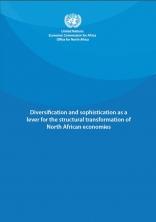Diversification and sophistication as a lever for the structural transformation of North African economies

The transition of the countries of North-Africa to the category of emerging countries will certainly take place through a major transformation of their economies; and this raises the issue of the processes to guide these structural changes. Moreover, insufficient growth results in these counties to face the challenges in the region and the subsequent relatively slow economic and social development, were in part attributed to the lack of diversification of these economies. North African countries are in general specialized in sluggish and low added value sectors or products. And even if some countries are more diversified that others, performances of most of the countries of the region are heavily dependent on raw materials prices or on climate hazards.
The high volatility of raw materials prices, coupled with the recent year’s crises, had slowed down the economic growth and showed a high vulnerability of North African economies to shocks, despite their low level of integration into the global markets, stressing the need of a structural transformation.
Indeed, this relatively specialization of the production and exportations of the countries and its negative impact on the development confirm the need to consider the diversification as a priority of the economic post-crisis reforms. The question that may arise then is how to stimulate and strengthen the diversification process in order to support the growth and improve the competitiveness of the North African countries? and consequently, how to make this diversification be the driver of the structural change of the North African economies?
Experiences of both developed and emerging countries, especially Asian ones, show that these countries achieved a real development mainly through the structural and deep transformation of their economies. Similarly, studies show that the transition from low-income countries to medium-income countries depends on a strong transformation of the economies, and emphasize the role of the States in this process. Indeed, the status of the economies implies active public policies to bring the deep developments that the market is unable to trigger automatically through resources allocation.
The question is how to stimulate and strengthen the diversification process in order to support the growth and improve competitiveness of North African economies. The strengthening of the process should take place in two directions. The first is related to the acceleration of the diversification pace; the second is a change in nature of the process through its reorientation towards more dynamic and new technology-intensive products. These processes, which will trigger a high added value, should be coupled with strategies encouraging exportations that allow for example, access to niche markets and the diversification of partners and markets. Modernization, sophistication and diversification of economic structures in these countries may be the new levers of the emergence of the region in the next years.
This report tries to shed light on some issues and challenges relating to the contribution of diversification and sophistication in the structural changes in North Africa. What is the status of diversification and sophistication in the region? What are the determinants thereof? What relation between sophistication, productivity and growth? What role the regional integration can play in the process of diversification and sophistication of economies? What lessons to be drawn from the specific experiences in Africa or in the emerging countries?
A better understanding of these challenges will open new prospects that will offer new bases for a sustainable and strong growth to achieve the sustainable improvement of the population well-being. The Bureau wants to thank Professors Nicolas Peridy and Nizar Jouini, for having elaborated this draft report to be submitted to experts. The Bureau also thanks all experts who contributed, directly or indirectly, to the conclusions of this report.